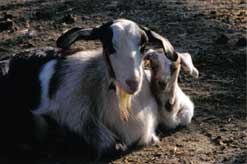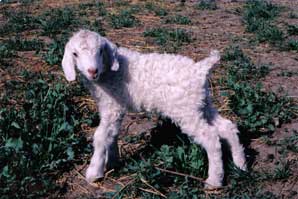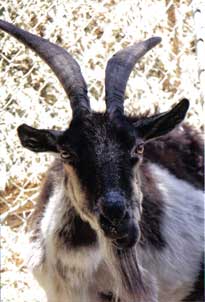







 |


|
SPECIALLY BRED
Goats R Us has incorporated several different breeds of goats,
each selected to contribute desirable traits into the herd. These
animals have been selectively bred to create the ultimate grazing
machine. Angora goats are our primary stock because of their hardiness
and thick mohair, which keeps them comfortable in the chilly northern
California winters (they are sheared in the spring to keep them
comfortable in the summer). We have cross-bred these Angoras with
Pygmy goats, as smaller goats are more desirable in areas where
erosion is of concern. In addition, we have bred into our stock Alpine
and Spanish goats, for extra hardiness and their ability to
thrive on a wide variety of feed sources. Our goats are then divided
up into herds that are specifically designed to work in a particular
job site. |
 |
|
 |
THE NEW RECRUITS
Every winter, a pre-selected group of nannies gives birth to
single, twin, or triplet offspring. These babies are raised with the
herd, where they learn to work with the dogs, the fences, and the
people. In addition, exposure to the local flora as adolescents
results in goats that thrive on the wide variety of forage species
they will be expected to consume in their adult lives. Every so often,
babies are bottle-raised by us when rejected by the mama. These become
our special friends, following us around the ranch as we work. |
|
RETIREES
As with any good company, Goats R Us has a retirement program
for its loyal four footed employees. The goats in our herd are never
sold for any reason, and when their "golden years" approach, their
scope of work is kept local, just outside of our ranch, where they can
roam the hills without encumbering the stress of traveling between
locations. All goats are supplemented year round, wormed three times a
year and vaccinated, but the geriatrics are given special
consideration. They are our “buddies,” and an integral part of our
team, without whom we wouldn't be able to enjoy our success.
Frequently, these retirees are visitors at local schools or senior
centers becoming ambassadors for their kind. |
 |
|